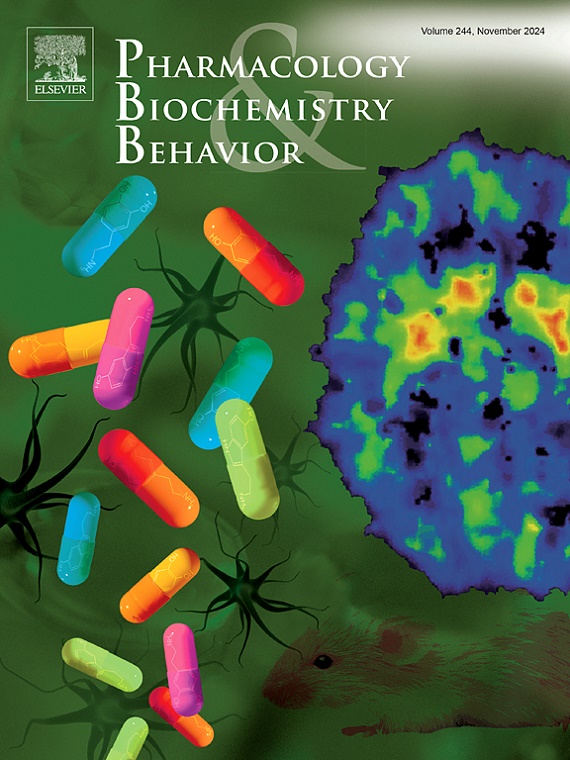重复暴露于乙醇会改变斑马鱼大脑的记忆获得和神经传递参数。
IF 2.5
3区 心理学
Q1 BEHAVIORAL SCIENCES
引用次数: 0
摘要
酒精在全球范围内被广泛饮用,滥用酒精会导致认知功能障碍,并由于多种神经生理变化而影响记忆和学习。包括胆碱能和谷氨酸能系统在内的多种神经递质失衡与这些影响有关。斑马鱼对酒精很敏感,对奖赏刺激有反应,能容忍并表现出戒断行为。因此,我们研究了重复暴露于乙醇(REE)和 NMDA 受体拮抗剂地佐西平(MK-801)对记忆获得以及谷氨酸能和胆碱能神经传递的影响。使用抑制性回避和物体识别任务对记忆进行评估。脑谷氨酸水平和Na+依赖性转运体的活性被评估为谷氨酸能活性的指标,而乙酰胆碱酯酶(AChE)和胆碱乙酰转移酶(ChAT)的酶活性被评估为胆碱能活性的指标。行为评估显示,REE 会损害厌恶记忆和空间记忆,MK-801 可模拟这种效应。REE 组的谷氨酸水平显著降低,但转运体活性却没有降低;同样,REE 增加了 AChE 的活性,但 ChAT 活性却没有增加。这些发现表明,间歇性接触乙醇会导致斑马鱼记忆巩固功能受损,而这些影响可能与谷氨酸和乙酰胆碱介导的神经传递系统相关参数的改变有关。这些结果有助于更好地理解重复使用酒精导致的神经生理和行为变化。本文章由计算机程序翻译,如有差异,请以英文原文为准。
Repeated exposure to ethanol alters memory acquisition and neurotransmission parameters in zebrafish brain
Alcohol is widely consumed worldwide and its abuse can cause cognitive dysfunction, affecting memory and learning due to several neurophysiological changes. An imbalance in several neurotransmitters, including the cholinergic and glutamatergic systems, have been implicated in these effects. Zebrafish are sensitive to alcohol, respond to reward stimuli, and tolerate and exhibit withdrawal behaviors. Therefore, we investigated the effects of repetitive exposure to ethanol (REE) and the NMDA receptor antagonist dizocilpine (MK-801) on memory acquisition and glutamatergic and cholinergic neurotransmission. Memory was assessed using the inhibitory avoidance and object recognition tasks. Brain glutamate levels and the activity of Na+-dependent transporters were evaluated as indexes of glutamatergic activity, while acetylcholinesterase (AChE) and choline acetyltransferase (ChAT), enzyme activity were evaluated as indexes of cholinergic activity. Behavioral assessments showed that REE impaired aversive and spatial memory, an effect that MK-801 mimicked. Glutamate levels, but not transporter activity, were significantly lower in the REE group; similarly, REE increased the activity of AChE, but not ChAT, activity. These findings suggest that intermittent exposure to ethanol leads to impairments in zebrafish memory consolidation, and that these effects could be associated with alterations in parameters related to neurotransmission systems mediated by glutamate and acetylcholine. These results provide a better understanding of the neurophysiological and behavioral changes caused by repetitive alcohol use.
求助全文
通过发布文献求助,成功后即可免费获取论文全文。
去求助
来源期刊
CiteScore
6.40
自引率
2.80%
发文量
122
审稿时长
38 days
期刊介绍:
Pharmacology Biochemistry & Behavior publishes original reports in the areas of pharmacology and biochemistry in which the primary emphasis and theoretical context are behavioral. Contributions may involve clinical, preclinical, or basic research. Purely biochemical or toxicology studies will not be published. Papers describing the behavioral effects of novel drugs in models of psychiatric, neurological and cognitive disorders, and central pain must include a positive control unless the paper is on a disease where such a drug is not available yet. Papers focusing on physiological processes (e.g., peripheral pain mechanisms, body temperature regulation, seizure activity) are not accepted as we would like to retain the focus of Pharmacology Biochemistry & Behavior on behavior and its interaction with the biochemistry and neurochemistry of the central nervous system. Papers describing the effects of plant materials are generally not considered, unless the active ingredients are studied, the extraction method is well described, the doses tested are known, and clear and definite experimental evidence on the mechanism of action of the active ingredients is provided.

 求助内容:
求助内容: 应助结果提醒方式:
应助结果提醒方式:


